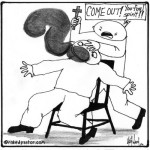We run our website the way we wished the whole internet worked: we provide high quality original content with no ads. We are funded solely by your direct support. Please consider supporting this project.
Are you a pietist?
Question: Soon after the publication of your book The Myth of a Christian Nation, I heard Chuck Colson charge you with being a “pietist.” Since then, others have repeated the charge. They all claim you advocate a Gospel that focuses on individual salvation but leaves social issues for government to address. Are you a pietist?
Answer: Am I a “pietist”? My answer is: “absolutely not” as well as “yes – and proudly so.”
I am absolutely not a “pietist” if one means by this someone who thinks Christians should focus on individual piety and leave all social transformation to government. In my book The Myth of a Christian Nation, I repeatedly call on Christians to engage in social activism. In fact, I argue that this is what the Gospel is all about! Using the unique power of Christ-like love, the Church is to take responsibility to address issues such as homelessness, hunger, racism, sexism, greed, social injustice, drug abuse, sexual brokenness, domestic violence, and AIDS (see, e.g. Myth, pages 115-16, 119-26; 141-46; 178 -86. I’ll be developing this thesis more extensively in my forthcoming book, Revolting Beauty).
So why do Chuck Colson and others charge me with advocating a “pietistic” withdrawal from social issues? I strongly suspect that it’s because Colson and others are working with a paradigm in which social transformation and political involvement are inseparably connected. In this paradigm, “social activism” pretty much means “political involvement.” Since I emphatically deny that there’s a unique “Christian” way of being politically involved, Colson and others conclude I must be divorcing the Christian faith from social activism.
Now, of course political involvement is one way of being socially active. But why should Christians think that this way of being socially active is superior to other ways? As I argue in my book, social transformation was at the center of Jesus’ life and ministry, and yet he never so much as commented on the politics of his day. Jesus lived in politically hot times, and people were constantly trying to get him to throw his weight behind this or that political issue, but Jesus consistently refused. (One wonders, would this make Jesus a “pietist?”). The fact is that Jesus was a radical social activist, but he simply refused to let politics define the terms of his social activism. As those who are called in imitate Jesus (Eph.5:1-2), I contend that we should do the same.
We who pledge ultimate allegiance to Christ should individually and collectively engage in social activism in a unique, Christ-like kind of way. Our focus as Christians shouldn’t be on trying to transform society through political means, but on individually and collectively transforming society by humbly serving it in every way possible. And our focus should be on modeling to the world a community in which the ills that plague humanity are being overcome through the love and power of God. We are to manifest and expand the unique, beautiful Kingdom of God.
Now, as people who live in a free country, we certainly can and should participate in the political process however we feel led. But we must always remember that our unique authority as followers of Jesus doesn’t reside in how we cast a political vote, but in how we vote with our lives. Being a follower of Jesus doesn’t mean we know more than others, but it should mean that we’re willing to sacrifice more than others. And our willingness to follow Jesus’ example of self-sacrificial love, even for our enemies, is our unique power to transform society.
Unfortunately, the western Church has, on the whole, done a rather poor job of manifesting this kind of love and power. Consequently, it’s hard for many to even imagine that this kind of social activism could be effective. The only kind of power most see as influential is political power, which is why most assume that if the Church is going to be socially relevant, it has to borrow capital from politics.
The truth, however, is that self-sacrificial love is the greatest power in the universe. This is the only kind of power the Church should trust and the only kind it should be focused on manifesting. If Christians in significant numbers would collectively sacrifice for the poor, the afflicted and the oppressed, the Church would have a transforming effect on individuals and on society that politics, police and armies could never dream of having. And if significant numbers of Christians engaged in this sort of self-sacrificial service, the credit for the social transformation it brought about would go to Jesus Christ, influencing more people to put their trust in him, rather than in Uncle Sam. This is the primary way the Church is to witness to the world that Jesus Christ is real and the primary way the Kingdom of God is to expand.
In any event, if Colson and others think I’m advocating that Christians withdraw from the public sector, it can only be because the Christ-centered model of transformation I’m calling for simply doesn’t fit their politically-orientated paradigm of social activism. And if “pietism” is understood to refer to this sort of withdrawal, then I am most certainly not a pietist.
In another sense, however, I am a pietist. While Colson’s understanding of pietism is very common today, the truth is that some of the best examples of a unique, Christ-like approach to social transformation are found among the pietists! As a matter of historical record, most pietists in the 17th and 18th century were not at all focused on personal piety at the expense of social transformation. To the contrary, many were renowned for the way in which they placed the onus of social transformation squarely on the church instead of on government. Independent of the government, they established schools, orphanages, shelters for the homeless, soup kitchens, and many other socially impacting ministries.
So, while I adamantly deny I am a “pietist” in Colson’s sense of the term, if one is speaking with historical accuracy, I proudly wear the label.
Category: Q&A
Tags: Politics, Q&A, Social Issues
Topics: Ethical, Cultural and Political Issues
Related Reading

How do you respond to Jeremiah 29:10–11?
The Lord says to Israel, “Only when Babylon’s seventy years are completed will I visit you, and I will fulfill to you my promise and bring you back to this place [Jerusalem]. For surely I know the plans I have for you, says he Lord, plans for your welfare and not for harm, to give…

How do you respond to Malachi 3:6?
“For I the Lord do not change; therefore you, O children of Jacob, have not perished.” Some cite this verse as evidence that God need never be flexible in his plans and change his mind. But this claim contradicts all the explicit declarations in Scripture which state that God does frequently modify his plans and…

What do you think of “confrontational evangelism”?
Question: In The Myth of a Christian Nation, you emphasize our need to sacrificially serve others. But you didn’t emphasize our need to “preach the Gospel to every living creature.” I’ve been intrigued by the movement known as “confrontational evangelism,” associated with Ray Comfort and Kirk Cameron. They stress the need to get people to…

Lighten Up: Election Season Blues
It’s a little sad (but still pretty funny) that there are actual campaign posters similar to this one. The next time you get fed up or discouraged with all the over-the-top election ads, you might want to browse through these for a chuckle. And remember that our hope is not located in any election. Thank…

Do Not Fear
We interrupt this election season to bring you the following reminder: [F]ear is a diabolic force. Its ultimate creator is Satan, and he uses it to keep us in bondage (Heb. 2:15). Throughout history, leaders have used fear to rally the masses around their causes, sometimes getting them to do things they otherwise would never…

